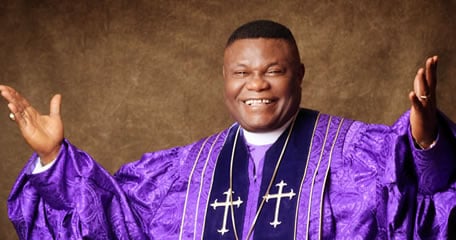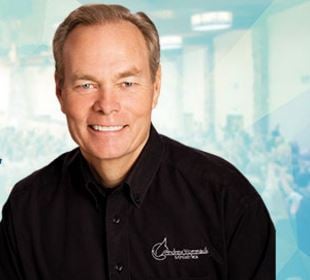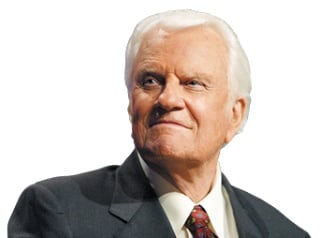God filled his world with props — with trees and eagles and mountains and fish and men — to reveal not just his creativity and power, but himself.
One of the most bewildering parables he conceived (before hills ever held them) is that of the shepherd and his sheep. Consider sheep — the most mentioned animal in the Bible. What are their virtues? Their fur is warm in the winter, and they are tasty in a gyro — but they have little more to show for themselves. They are not known for their strength, intelligence, speed, or beauty. They are not exotic like the tiger, awesome like the eagle, useful like the ox, crafty like the serpent, fearless like the warhorse, or kingly like the lion — they are just sheep.
No one desires to be known by a sheep’s characteristics. If you want to call someone timid, fretful, nervous, you call him sheepish. Sheep are also known for their stubbornness — a flock of teenagers who seem to always know better than the one leading them. They grumble by the shepherd’s side, texting their friends about him, wandering away from the only one there to keep them fed and sustain their lives. As one scholar summarizes, “Sheep are not only dependent creatures; they are also singularly unintelligent, prone to wandering and unable to find their way to a sheepfold even when it is within sight” (Dictionary of Biblical Imagery, 782).
Idyllic Hillsides
Instead of leaving sheep to their dumb determination to go extinct, God supplies men to meet their constant need for guidance and protection. Enter the shepherd — boys and men dedicated to caring for these creatures. We have seen so many images and sung so many songs of shepherds that we may visualize something rather romantic. We imagine serene oil paintings of distant hills depicting the simple life. But does the shepherd within the frame feel his life is rather like watching paint dry? Wouldn’t you wonder, if you were in his place, Is this really it?
“Why sheep and shepherds in this story of God, angels, and men? So that he might teach us about himself.”Would you spend your life as the friend of sheep? The solitude. The quiet. Yet the demands. The seeking of pasture. The surveying for predators. Many days the same. Strengthening, guiding, bandaging, rescuing those who speak not, help not, fight not, thank not. And they stray — how often they stray. You are a pastor, but you watch not for souls — immortal and more precious than the world — you watch sheep. You care for kids, but they are not your children. If it was easy enough for Satan to sell the idea that stay-at-home motherhood is drudgery itself, how much convincing would stay-on-the-hill shepherding need?
But at least we would be closer to God, right? Psalm 23 is so worshipful; shepherding seems the apex of the devotional life. No dinging, buzzing, rushing. No city smog clouding the heavens from our view. Yet how well did Alexander Maclaren challenge how near these hillsides are to heaven.
We can feel, in a kind of lazy play of sentiment, the fitness of the shepherd’s life to suggest thoughts of God — because it is not our life. But it needs both a meditative habit and a devout heart to feel that the trivialities of our own daily tasks speak to us of Him. The heavens touch the earth on the horizon of our vision, but it always seems furthest to the sky from the spot where we stand. (The Life of David as Reflected in His Psalms, 21)
In other words, you may sit in your cubicle or work in the cornfield or cook in the kitchen or pound away at the construction site — and think you are never further from spiritual reality. Young David too was disposed to be mishandled by monotony. None of us does well with sameness. Its spell sedates, blinding our eyes to the beauty we think we’ve already seen. It deafens the shouts of “Holy is the Lord God Almighty! The whole earth is full of his glory!” The green hills were not what drew David near to God; a meditative habit and a devout heart were — the kind of vision that can transfigure trivialities. Maclaren goes on,
To the psalmist, however — as in higher ways to his Son and Lord — all things around him were full of God; and as the majesties of nature, so the trivialities of man’s works — shepherds and fishermen — were solemn with deep meanings and shadows of the heavenly. With such lofty thoughts [David] fed his youth.
The shepherd had work in many ways like your work, yet he worked with sheep. But like David, you can look all around and see your world, even your small corner, as full of God.
Scandal of Shepherds
Consider again the job description. The picture borders on preposterous when one beholds the extent to which a good shepherd went to care for his sheep. Has the picture become too familiar to see? A man, the pinnacle of creation, is set to defend with his life a creature that is altogether uninspiring, unproductive, and unimpressive.
A good shepherd lays down his life for his sheep (John 10:11). Really? For sheep? The hit series, The House of David, covers up this reality, depicting David going after the lion, not because one of his sheep was in its jaws, but because it threatened his sister and family. To kill a lion harassing your family is honorable, manly, cinematic — but for a little lamb, not so much. Why should a man made in God’s image die on behalf of a creature that he might otherwise eat for dinner? Why would he trade his life for what is so evidently below him? Why did God fill his world with such an image?
A good shepherd dies for his sheep. Wives, would the news that your husband died protecting sheep comfort you in your widowhood? He didn’t die defending his sons or his faith or his country or you — he died for sheep. Why is the hired hand who flees the predator not the wise one? He is far more valuable than what he defends — why not let a lion take one away? What if David’s headline read differently: “Bear mauls local boy attempting to rescue lamb”? Would we think this tragedy more heroic or wasteful? Again, why did God fill his world with such an image?
The shepherd’s life played the same confusing song on repeat — the crown of creation (man) caring for the constant needs of helpless creatures (sheep). What was God up to with such a scene? He was teaching us — not just about his creativity or his power, but about himself.
Lesson from the Pasture
You and I “like sheep have gone astray; we have turned — every one — to his own way” (Isaiah 53:6). In sin, we are dumb and wander toward the cliffs, determined to go extinct. We baa helplessly, though we think ourselves lions. We have little to offer, though we think ourselves like God. We are creatures who sinned and are headed toward slaughter.
Yet who is the great God above? What is he like? How will he respond to rebellious creatures who profit him nothing? Is he indifferent? Merciless? Will he be deaf to our sorrows as we have been deaf to his supervision? Will he leave us to our own way?
He answers by sending his Son to our hillside to be our shepherd. Jesus Christ came to seek and save the lost. God thought of sheep and made them a sacrifice for sin to prepare us for the Lamb of God who takes away the sins of the world. He sent men to care for sheep to reveal himself as the Good Shepherd to the imperiled and unimpressive.
He — God the Son taking on flesh — came after us. He rescues the lost. His was no idyllic pastorate. His hillside was covered with wolves and lions, and he bled as he gathered up his lambs into his arms. He laid down his life for his sheep. And he rose again from the grave. He still feeds us. Still protects us. Still leads to good pastures and gives us rest. Still calls to those who will hear his voice. If you can hear him today, come. None of his flock will be missing.
So, why sheep and shepherds in this story of God, angels, and men? So that he might teach us about himself. His love. His leadership. His toughness and tenderness. His grace. That he might illustrate his inexplicable affection for unworthy creatures, and teach their lips one of the greatest lyrics earth has ever known: The Lord is my Shepherd.

.jpeg)















.jpeg)













 English (US) ·
English (US) ·